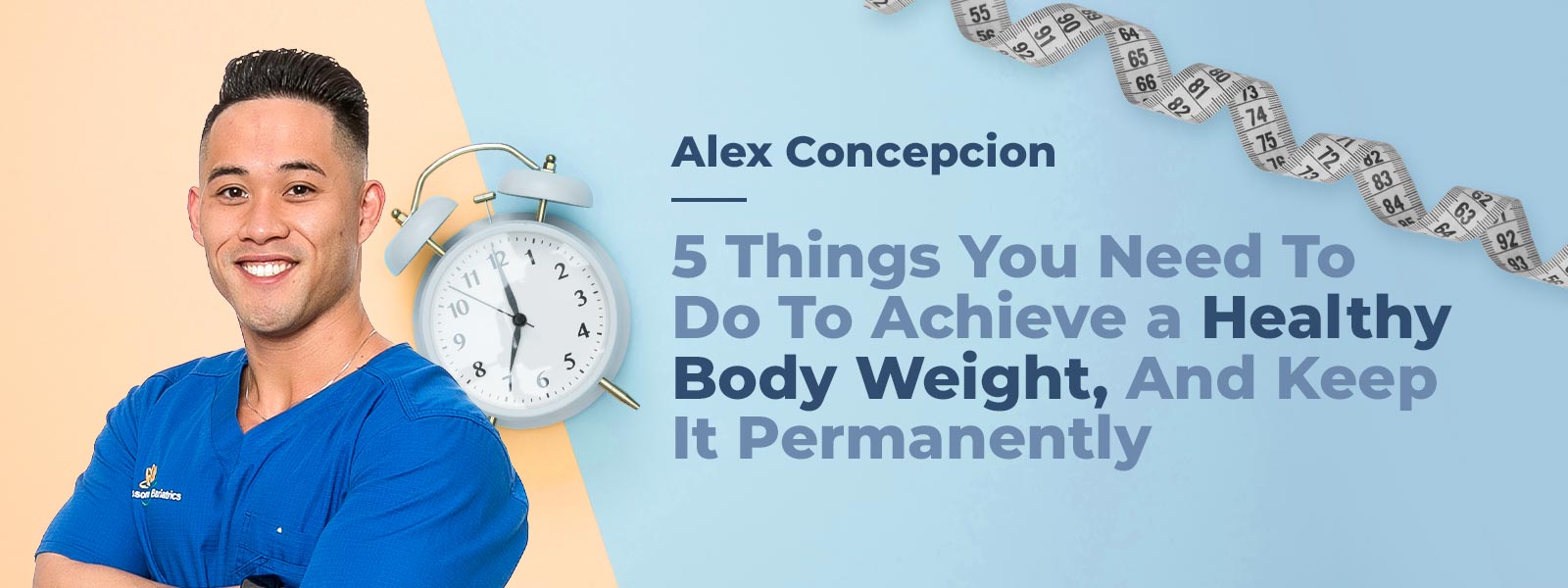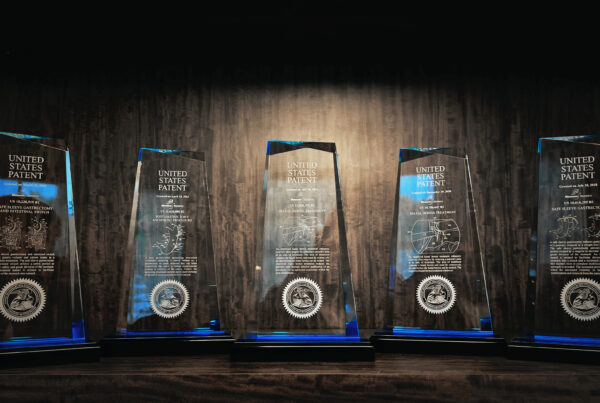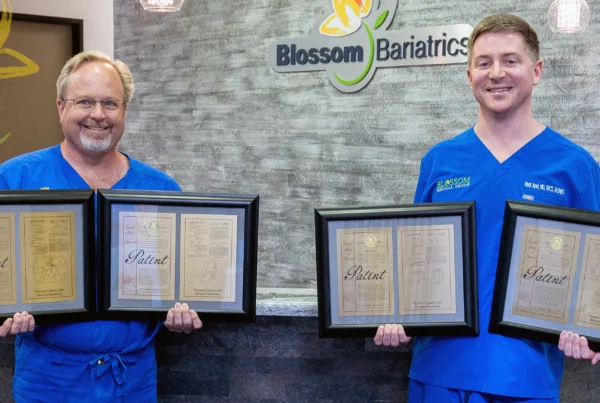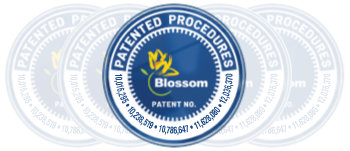Somany of us have tried dieting. All too often though, many of us lose 10–20 pounds, but we end up gaining it back. Not only is yo-yo dieting unhealthy, it is also demoralizing and makes us feel like giving up. What exactly do we have to do to achieve a healthy body weight and to stick with it forever?
In this interview series called “5 Things You Need To Do To Achieve A Healthy Body Weight And Keep It Permanently” we are interviewing health and wellness professionals who can share lessons from their research and experience about how to do this.
As a part of this series, I had the pleasure of interviewing Alex Concepcion.
Alex Concepcion is a registered dietician at Blossom Bariatrics in Las Vegas, Nev. Over the past three years, Alex has worked with hundreds of Blossom patients to help them change their lifestyles so that they can keep the weight off long term following bariatric surgery. Dozens of patients a month fly into Las Vegas to have life-changing bariatric procedures at Blossom Bariatrics. Then, Alex works closely with them to offer support and teach them ways to improve their nutrition and their daily fitness routines. A native of Chicago, Alex moved with his family to Las Vegas as a child and later graduated from UNLV. In his downtime, Alex is a professional bodybuilder who has competed in numerous physique competitions. Alex considers some of his biggest professional accomplishments being the instances when he’s helped patients go from being chronically overweight to the point where they can confidently go on stage and compete in bodybuilding events.
Thank you so much for joining us in this interview series! Before we dive into the main focus of our interview, our readers would love to “get to know you” a bit better. Can you tell us a bit about your childhood backstory?
Iwas born in Chicago. I have two brothers, and I am the middle child. We moved to Las Vegas when I was six years old. So, we came from humble beginnings, but my parents always made sure we had food on the table and a roof over our heads.
My love for fitness actually started because I was a huge fan of Jean-Claude Van Damme. I was always doing the splits like him, and then my mom actually put me in gymnastics and one of those summer programs for little kids. It turned out I did have some talent and that led me into competitive gymnastics. I actually performed on Fremont Street in Las Vegas during the torch-lighting process before the 1996 Summer Olympics. I was 10 years old at the time, but those moments really serve as a foundation of who I am in terms of my physical fitness and liking fitness and good health.
What or who inspired you to pursue your career? We’d love to hear the story.
Actually, my story has lots of layers. I graduated high school at 16 years old and I left home at 17. I decided that I was going to pay my way through college and I started in nursing, and that just didn’t click for me. I switched to business and then the economy crashed, and I dropped out of college altogether. I went and pursued law enforcement, but before I made it to the Academy something influenced me to go back to school. I ended up going through the UNLV catalog and, at that time, I didn’t even know that you could get a degree in nutrition. I didn’t know that this was a path I could take. Health and nutrition have been the only things that have been consistent in my life and my passion has always been there for staying healthy and in shape.
So, that’s kind of how I started down the path of nutrition. Fast forward to graduation, I’m applying for internships and clinicals and I learned that my grandmother, Florinda Racal, was a dietician years earlier. Then, in 2018 when I started at Blossom, I learned that my grandfather, Dr. Juan Racal, was a bariatric surgeon. He was actually one of just two surgeons who did bariatric procedures in Chicago in the 1970s. So, I don’t know if that’s inspiration or fate, but it’s a weird thing that happened in my life and it might have been a big influence for me.
None of us can achieve success without some help along the way. Was there a particular person who you feel gave you the most help or encouragement to be who you are today? Can you share a story about that?
The turning point to go back to college came when my girlfriend at the time — she’s my wife (Shazelle Hayden) now — in so many words told me that she didn’t want to be with a quitter or a dropout. Basically, she was telling me that I was on the path to becoming a loser, and that hit me hard.
Looking at the UNLV course catalogue, it was my wife who ultimately got me to do that.
The drive to get to where I am now came from the fact that I came from humble beginnings. I grew up with hostility in the house, alcoholism, gambling and financial problems, and the motivation was always there to be better than that. That’s one of the reasons that I left home at 17 because I always knew I wouldn’t be able to thrive in that environment.
At the time, I just needed direction.
Can you share the funniest or most interesting mistake that occurred to you in the course of your career? What lesson or take away did you learn from that?
Early on, when I was first out of college, I did more consultations and personal training. I received a call from a client that I was training and he decided to FaceTime me. We had developed a close dynamic, so we always kept everything casual.
I love to laugh and I joke around quite a bit, so let’s just say that I wasn’t completely decent for the FaceTime call. The first thing I see when I accept the call is a board room with his entire executive team. I was like, ‘Oh no! Let me grab a shirt!’
The lesson here is to always be prepared! That experience actually led to a good contract, and it got me a few guest appearances on their podcast and helped me build a good relationship with the owner of the company. I ended up training the owner of that company. That was crazy, but it turned out OK for me.
Can you share your favorite “Life Lesson Quote”? Why does that resonate with you so much?
I have three life lesson quotes that I use all of the time. This isn’t an original quote, obviously. I say, ‘Constant pressure over time creates diamonds.’ I’ve been saying that since college and I say it to all of my clients. I tell them to embrace the pressure because we’re creating diamonds here.
Also, I like telling this to my clients: ‘Nothing worth having comes easy!’
What I have been saying most of all lately — more so because of COVID and everything that has happened over the last year — is this: ‘Don’t wait for the storm to pass; learn to dance in the rain.’
A lot of people have been waiting for the gyms to open … or waiting for everything to open back up before they lose weight or get their health back in check. Or, ‘I’ve been furloughed … my job isn’t back all the way yet’ … Well, I’m like, ‘Why don’t you do something now? You can still do pushups! You can still do squats! You can still get food that is healthy!’
What are some of the most interesting or exciting projects you are working on now? How do you think that might help people?
I actually started a podcast during COVID. It’s called, ‘The Blossom Podcast,’ and it has a lot of guest interviews and frequently asked questions, and I’ve even been interviewing the doctors on the show. It’s just about getting that correct information out there for the patients.
I actually call it, ‘Info-besity,’ because there is so much information out there and it all kind of blurs together. You don’t know what’s right or what’s wrong. So, if we’re going to be promoting what we teach, at least there’s a resource for everybody to jump on and listen to. Not only that, you can hear about other people’s journeys — not just the good, but the good and the bad. You get the raw info and you get to hear about people’s struggles. For some people, that helps them understand that, ‘Hey, this is not a quick fix!’ All of these people that you see that are doing well now, you can hear about their struggles along the way. It wasn’t an overnight thing for them.
We’re here to help people. However, because we only get so much time with patients, there are a lot of frequently asked questions. With the podcast, we can dive in for more than 15 minutes and cover several topics.
I’m also actually working on a new YouTube page right now that will focus simply on cooking and recipes. I’m launching it in early July and it actually will be called, ‘Grub Rite.’
For the benefit of our readers, can you briefly let us know why you are an authority in the fitness and wellness field?
I’m a board-certified, registered dietitian, and also I’m a pro bodybuilder. In terms of nutrition, and lifestyle, I’ve worked with hundreds of people through the entire spectrum of weight management. It ranges from wanting to get healthy, to extreme weight loss, to chronic illness-related issues, to surgical weight loss cases, as well as competitive bodybuilding and all the classes in that umbrella for men and women.
OK, thank you for all of that. Let’s now shift to the main focus of our interview about achieving a healthy body weight. Let’s begin with a basic definition of terms so that all of us are on the same page. How do you define a “Healthy Body Weight”?
There’s no body shaming here. I believe that no one can tell someone what their goals should be. My definition for ‘Healthy Body Weight’ is happy and not at risk for chronic illness related to weight. They can be at a healthy weight and still be unhealthy. You can be skinny and unhealthy, and you can be heavy and healthy. So, that’s where it’s kind of a broad spectrum there. Patients will be like, ‘Okay, what is the number you want my weight to be?’ I can give you a number, but there are so many other factors involved. Again, my definition for ‘Healthy Body Weight’ is happy and not at risk for chronic illness related to weight.
How can an individual learn what is a healthy body weight for them? How can we discern what is “too overweight” or what is “too underweight”?
This is where it comes to assessment. It’s always good to get a physical and get your labs done before starting out on a weight-loss program. Then, you can talk to a dietician, you can talk to a healthcare professional or a fitness professional, and they can assess it for you. They could base their assessments on chronic illnesses and co-morbidities and filter those things out and create create a healthy weight range for you. That’s the best way for somebody to go about determining a ‘Healthy Body Weight’ because everybody is different.
This might be intuitive to you, but it will be instructive to expressly articulate this. Can you please share a few reasons why being over your healthy body weight, or under your healthy body weight, can be harmful to your health?
Being underweight, you’re at risk for impaired immune functions, getting sick frequently, nutrient deficiencies, osteoporosis, and for women, problems with with childbirth.
Things like that are all risk factors for being underweight and overweight. If you are overweight, you have a risk of diabetes, hypertension, heart disease, stroke and fatty liver. There’s also infertility in men and women. I can’t tell you how many people who come come to Blossom who previously have been unable to have children, and then they become ‘Fertile Myrtles’ afterward.
More than anything, it’s just about them not having that ability to be active for their kids or even putting their own survival at risk. I’ve even mentioned to some patients, ‘What if you have to run for your life to get away from something?’ Or, ‘What if your reflexes are slow from being overweight?’ Those are more reasons to get healthy.
In contrast, can you help articulate a few examples of how a person who achieves and maintains a healthy body weight will feel better and perform better in many areas of life?
Every area of your life will be better when you are at a healthy weight. Again, it’s just about being able to move better, being able to survive, hang out with your kids, play with your kids and breathe better. It just allows you to be able to enjoy life more.
After you get better, what comes with that is improved confidence. When it comes to confidence, that just resonates in a lot of ways. A lot of times, people are unhappy with their weight or it shows in their face. But when they are healthy, that shows in the face as well with the smiles and enjoying life more.
Much of enjoying life more can boil down to the physiological side of things, such as better blood flow, better relationships, better sexual experiences and things like that. You’re not so bogged down and that’s going to make you feel better in many ways.
Ok, fantastic. Here is the main question of our discussion. Can you please share your “5 Things You Need To Do To Achieve a Healthy Body Weight And Keep It Permanently?”. If you can, please share a story or an example for each.
The first one is, ‘Seek help.’ We can’t do it alone. This is where I say to get that physical, meet with the dietician and see where where your starting point is.
Number two, ‘Have a goal in mind.’ When you don’t have a goal, you’re not going to be really striving for anything. You’re just living life and you’re just going and hoping for the best. So, when you have a goal, at least you can have a direction.
Number three, I would say, ‘Get a plan for that goal.’ When we’re talking about a plan, we’re talking about what are the foods that I can eat? What times should I eat? How is it going to affect my work schedule and my life schedule? What’s the best way to approach all of those things to be able to fit them into your life? Those who fail to plan are those who can plan on failing!
Number four, I would say, ‘Test the plan.’ Everything looks good on paper, right? But when we actually live it, there are going to be hurdles. Being able to test that plan is going to allow you to find out what is successful. I always say, ‘Every diet works, but you just haven’t done it long enough.’ We haven’t done it long enough because life gets in the way. So, you’re going to be able to test that plan and then repeat it over and over.
Number five is, ‘Put that plan into your lifestyle.’ It’s all about turning a tested plan into a lifestyle. This is a lifestyle, not just a diet. This is something that you have created as a foundation into your new healthy lifestyle.
The emphasis of this series is how to maintain an ideal weight for the long term, and how to avoid yo-yo dieting. Specifically, how does a person who loses weight maintain that permanently and sustainably?
So, this is this goes back to the five things. We have a happy, healthy weight that we’re at and this has been tested. You have to be able to withstand the struggles in the beginning, and then learn what the body does and how it responds to your new lifestyle. That will create a lifelong balance for you.You have to know how to incorporate a treat meal and how to make sure you’re getting your vegetables. You must have a plan for 70 to 80 percent of your day, or you have no idea what’s going to happen and you might fail. It will take a period of time to learn about your new body and learn to create balance.
What are a few of the most common mistakes you have seen people make when they try to lose weight? What errors cause people to just snap back to their old unhealthy selves? What can they do to avoid those mistakes?
The most common mistakes, in my opinion, are the fad diets. There are so many fad diets in society right now and they influence people to choose a side. It’s either, ‘I’m keto,’ or ‘only a carnivore’ or you ‘only eat vegetables.’ But when it gets to that point, it’s usually unsustainable.
When we get to that point, it’s usually because we are seeking a desirable look because of somebody on social media. In the back of your mind, you know that you aren’t going to be able to sustain that and you are actually setting yourself up for failure. There’s huge influence and marketing on the keto diet, but if you love carbohydrates you are not going to be able to last on that diet. The goal has to be greater than the bag of chips. Until you have something that is present, it’s going to be too easy to lapse into those old habits.
Long term, having a buddy or having somebody to go along this journey with — or even going to counseling — those are very good things to do. We know sugar is an addiction, and you’re going to need help breaking that addiction.
At the end of the day, it’s just good to recognize our faults and know what’s bringing us back and understand that we must work through that. There’s no one answer, unfortunately, but what we can do is work toward creating the awareness to know what will trigger us back into bad habits.
How do we take all this information and integrate it into our actual lives?
The truth is that we all know that it’s important to eat more vegetables, eat less sugar, etc. But while we know it intellectually, it’s difficult to put it into practice and make it a part of our daily habits. In your opinion what are the main blockages that prevent us from taking the information that we all know, and integrating it into our lives?
It’s marketing. Marketing is is the biggest influencer on all of us. Billions of dollars are spent to take that apple out of your hand and put a bag of chips, or McDonald’s, or something else in the place of the apple. Let’s be honest, those chips or fast food taste good and it is extremely convenient for us. So, it takes having a goal and us needing the goal to be greater than the influence in order to have success. With that said, there’s also balance. We can create balance in other convenient ways. You can make sure that you have vegetables with every meal. Yes, you can go to a party and get barbecue, but first thing in the morning have a green shake and essentially set the tone for the day. It’s truly all about knowing that with that shake you got a ton of fiber, a ton of nutrients and you are setting the tone for the day. You’ve already got those knocked out by morning and, even if you make some bad choices at the barbecue, you already know you made better choices early on in the day.
On the flip side, how can we prevent these ideas from just being trapped in a rarified, theoretical ideal that never gets put into practice? What specific habits can we develop to take these intellectual ideas and integrate them into our normal routine?
It’s all about setting the tone for the day early on. Because of all the influences that we have from the fast food industry, it’s always good to start the day with a green shake. It’s not that we don’t have time to make good decisions, and it’s not that we don’t have the resources to make good decisions. If you can prioritize fruits and vegetables and nutrient-dense foods early on in the day, then that mindset will trickle down throughout the day and you can set the tone in the morning. You’ve started your day with something great, and it will trickle down. That’s something great that you can do. I also use that as a tool for when I know that I’m going to a barbecue, or it’s Thanksgiving, or Christmas dinner. Planning ahead is going to help you have a nutrient-dense shake first, and that will not only prevent you from going overboard, but it will also ensure that you’ve already had your fruits and vegetables.
Ok, we are nearly done. You are a person of great influence. If you could inspire a movement that would bring the most amount of good for the greatest number of people, what would that be? You never know what your idea can trigger.
I like to think that I am extremely positive person and you can influence someone else’s day with a smile or a compliment. You never know what somebody else is going through at any given moment. So, my movement would be to smile at every person that you see and pay them a compliment. I feel like that could make the world a better place, even if we’re forcing the positivity. We need a shift in positivity in this world. I just feel like a smile or a compliment would make a big difference in the lives of so many people.
We are very blessed that some of the biggest names in Business, VC funding, Sports, and Entertainment read this column. Is there a person in the world, or in the US, whom you would love to have a private breakfast or lunch with, and why? He or she might just see this, especially if we both tag them 🙂
It’s got to be Dwayne “The Rock” Johnson! I admire his drive, him going from rags to riches, as well as him maintaining that positive influence on others. All of that, and he’s one of the biggest advocates for health and wellness as well. One of the coolest things, too, is the story of him going from $7 in his pocket to where he is now. He is one of the biggest names in everything, and everything that that guy touches turns to gold. So, he’s one of the people that I really admire a lot.
How can our readers further follow your work online?
First off, everybody can follow the work that we’re doing on Blossom’s website — www.blossombariatrics.com — and on all of its social media channels.
As for me personally, you can find me on Instagram at @Alex_RiteLife.
Thank you for your time, and your excellent insights! We wish you continued success.




